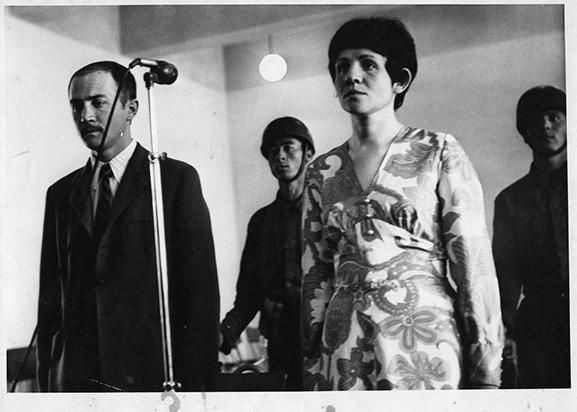In English
Presented in the framework of the exhibition Step Out of the Strange Light
Follow this link for the video of the panel discussion
The second panel discussion held on the occasion of the group exhibition Step Out of the Strange Light deals with relationships between transitional justice and artistic practices in the context of the Yugoslav Wars. Panel I brought together artists whose works address war crimes and their reappraisal. Panel II invites artists, writers, and academics who are engaging in feminist analyses of the underlying structures that shape women’s lives in post-conflict societies.
The panel will discuss research-based practices that draw on autobiographical, political, cultural sources, as well as concepts of security and power, truth-seeking, and rehabilitation. Participants will reflect on ways of addressing the continued violence against women, historical memory, and genocide. Processes will be examined through which atrocities and traumas suffered by women are marginalized and erased from collective memory.
The panel will raise critical questions about ethics and navigating complex and painful processes and experiences, highlighting the need for strategies to confront communities about the repression of traumatic histories and potential reconciliation. This also includes the responsibility to create safe spaces and platforms that support women in articulating their haunting experiences in the face of being denied political justice and reparations.
Slavenka Drakulić (*1949 in Rijeka / Croatia, lives and works in Stockholm and Zagreb) is a journalist, novelist and essayist. Drakulić is recipient of the 2004 Leipzig Book Award for European Understanding for her essay They Would Never Hurt a Fly. War Criminals on Trial in the Hague (London: Penguin Books). In 2016, her novel Dora und der Minotaurus (Berlin: Aufbau TB) about Dora Maar and Pablo Picasso was published in Germany. In 2021, Drakulić released her collection of essays Café Europa Revisited: How to Survive Post-Communism (New York: Penguin Books) in the USA. As a journalist, she contributes to many international newspapers and magazines.
Šejla Kamerić (*1976 in Sarajevo, lives and works in Berlin and Sarajevo) is a visual artist known for her practice encompassing film, photography, objects and drawings. In 2011, she received the ECF Princess Margriet Award for Cultural Diversity. Her work has been shown in various international exhibitions, a. o. Museum of Contemporary Art Barcelona (solo, 2011); Museum of Contemporary Art, Zagreb (2011); Musée d’Art Moderne de la Ville, Paris (2007). Moreover, her work aus been included in numerous collections including Tate Modern, London, and Museum Boijmans Van Beuningen, Rotterdam.
Gülsün Karamustafa (*1946 in Ankara, lives and works in Istanbul) received her diploma in 1969 at the Istanbul State Academy of Fine Arts. Karamustafa was a laureate of the 2014 Prince Claus Award for her outstanding achievement in the field of culture and development. Her work has been presented at numerous international exhibitions, a. o.: Hamburger Bahnhof – Museum of Contemporary Art (solo, 2016); São Paulo Biennial (2014); SALT, Istanbul (solo, 2013); Gwangju Biennale (2014; 2000).
Lívia Páldi (*1967 in Budapest, lives and works there) works as curator. She has organized lectures, workshops and numerous exhibitions and is the editor of various publications. Between 2017 and 2021 she was curator of visual arts at Project Arts Centre, Dublin. Páldi was the director of Baltic Art Center, Visby / Sweden (2012–2015) and chief curator at the Műcsarnok – Kunsthalle Budapest (2007–2011). She was one of the curatorial agents of Documenta 13 (2012) and member of the OFF-Biennale Budapest curatorial board in 2016.
Jasmila Žbanić (*1974 in Sarajevo, lives and works in Sarajevo and Berlin) is a graduate of the Dramatic Arts, Theatre and Film Directing Department at the University of Sarajevo. Her feature debut Grbavica (2006) won several prizes including the Golden Bear at the 56th Berlin International Film Festival. On the Path (2010) premiered in the Competition of the 60th Berlin International Film Festival; For Those Who Can Tell No Tales (2013) premiered at the 2013 Toronto Film Festival. Her film Quo Vadis, Aida? (2020) was nominated for the Best International Feature Film at the 93rd Academy Awards, Los Angeles. All her films were produced through Deblokada, an artists’ association and production company founded by Žbanić in 1997.
Please find more information about n.b.k., our exhibitions and events on our website.
Neuer Berliner Kunstverein e.V.
Chausseestr. 128-129
10115 Berlin
Telefon: +49 (30) 2807020
Telefax: +49 (30) 2807019
http://www.nbk.org
![]()
